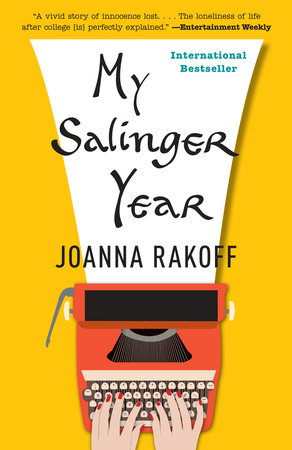My Salinger Year Reader’s Guide
By Joanna Rakoff


1. In what ways does Joanna Rakoff’s position at the Agency seem typical of many young people’s first post-college jobs? Has it gotten harder or easier for young people to start a meaningful career since then?
2. How much did Rakoff’s experience at the Agency match what she had imagined ahead of time about the glamorous world of publishing? Was her disillusionment inevitable?
3. When the book begins, Rakoff has just left her college boyfriend, even though it’s clear she’s still in love with him. She says she doesn’t understand why she did this. Is there anything in her behavior or situation that might shed light on her motives?
4. Rakoff’s boyfriend, Don, is a rather unpleasant character. Why does she stay with him as long as she does? Is there something universal about her experience with Don?
5. Rakoff never names the firm for which she works—calling it “the Agency”—nor does she name her boss or her college boyfriend. Why do you think she made this choice? Does it matter that she’s concealed the names? Would the memoir have more impact if the names were revealed?
6. Midway through the book, Rakoff’s father presents her with a stack of bills, revealing that he had taken out student loans in her name without her knowledge, forging her signature on the applications. He tells her the payments are her responsibility now, even though he knows she doesn’t make enough to cover them. Was this a good way to encourage financial responsibility? Should she have protested her father’s actions more strongly?
7. Part of the book’s plot line revolves around Rakoff and her closest friend, Jenny, growing apart. Jenny has chosen a more conservative path in life; Rakoff, a more bohemian one. Is growing apart from one’s childhood friends a universal part of growing up?
8. When Rakoff is asked to read Judy Blume’s new novel for adults, she recalls the important role Blume’s children’s books had played in her life as a young book lover. By contrast, she had never read J. D. Salinger before. Do you think Blume has the same sort of significant place in many young women’s hearts as Salinger does for many young men?
9. The Agency is almost a character in the book itself. How would you describe its personality? How important are the particular quirks of the place and of her boss to Rakoff’s development during this year?
10. Rakoff’s memoir is set at the dawn of digital technology. How does her employer’s resistance to using computers and insistence on using outdated Selectric typewriters and Dictaphones contribute to the strangeness of Rakoff’s experience working there? How differently might this story have played out if it had occurred a decade later, when email and the internet were more inescapable?
11. A turning point in the story comes when Rakoff decides to disregard her boss’s instructions to send out a form letter on Salinger’s behalf, and begins answering fans’ letters instead. Was this courageous or recklessly irresponsible? Why do you think she did it? What effect does it have on her?
12. What do the letters that Rakoff writes to Salinger’s adoring fans show us about her? To what extent is she writing them for herself?
13. J. D. Salinger was famously reclusive. What did you know about him before reading this book, and did any of his cameo appearances in the book change your image of him?
14. What sort of influence does Rakoff’s boyfriend have on her during this period of her life? What relationship do his literary ambitions have to her own? To what extent is finding her voice connected with breaking away from him?
15. What does it mean to Rakoff when Salinger dies? After reading the memoir, how would you explain her decision to entitle it My Salinger Year?
Just for joining you’ll get personalized recommendations on your dashboard daily and features only for members.
Find Out More Join Now Sign In